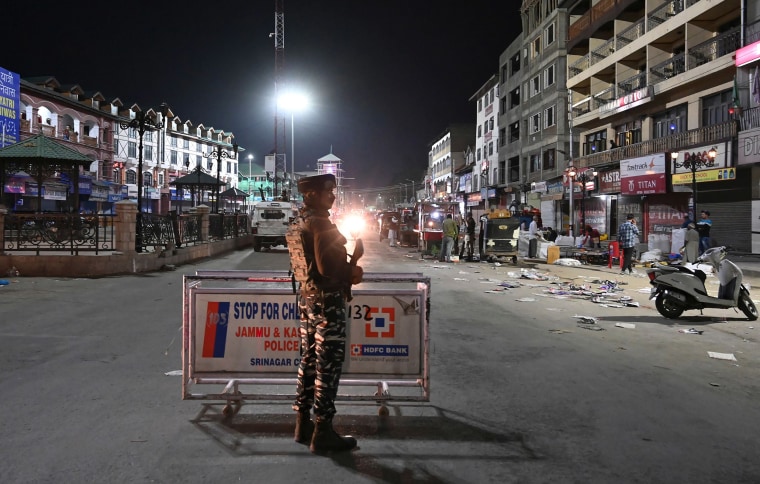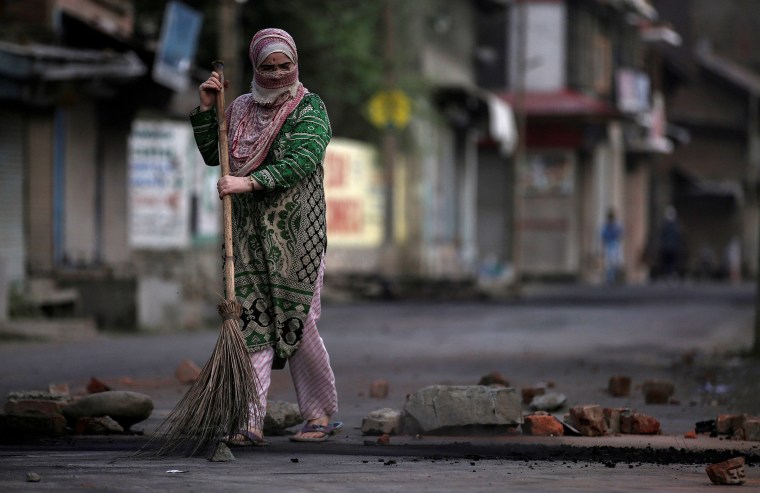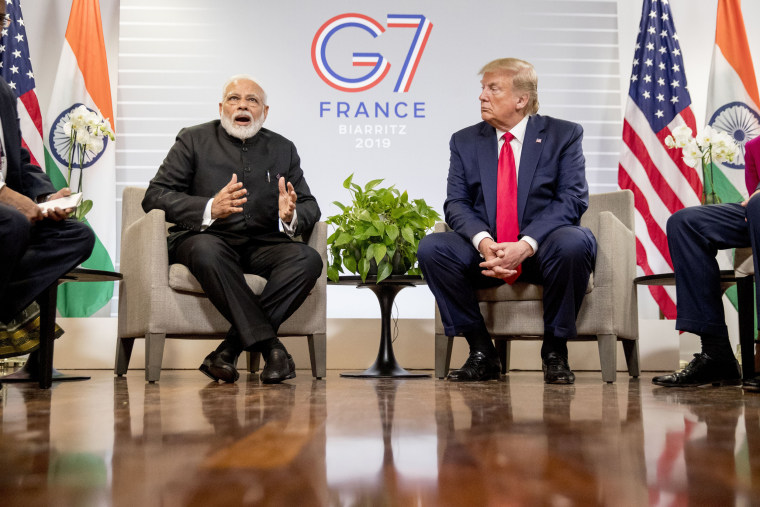As Indian Prime Minister Narendra Modi visits Houston on Sunday, some Kashmiri Americans are there to thank him. Others come in protest.
The split in the community comes after the Indian government revoked the Kashmir Province's special status in early August.
The move revoked Article 370 of the Indian Constitution, which grants Indian-administered Muslim-majority Kashmir a degree of autonomy. It had allowed the province its own decision-making powers and barred Indians outside Kashmir from buying land or permanently settling there.
Modi said last month the revocation would bring stability, boost the area economically, ensure equal rights for all and prevent corruption.
But critics of India's Hindu nationalist-led government see the move as an attempt to dilute the demographics of Kashmir with Hindu settlers.
One of the most militarized places in the world with a population of roughly 13 million, Kashmir is nestled among the nuclear powers of India, Pakistan and China and has been a source of contention in the region for decades.
India and Pakistan and both claim the region in its entirety and two of the three wars they have fought since their independence from British rule were over Kashmir.
Rebels in Indian-controlled Kashmir have been fighting Indian control since 1989. Most Kashmiris support the rebels' demand that the territory be united either under Pakistani rule or as an independent country, while also participating in civilian street protests against Indian control. About 70,000 people have been killed in the uprising and the ensuing Indian crackdown.
But this time, with the revocation of Article 370, things are different, according to Sameer Yasir, a journalist based in Kashmir.
"It's nothing like before," Yasir said. "There's so much of silence that it looks like a graveyard."
With the revocation of Article 370 came the suspension of internet and cell service, enactment of a curfew and the detention of some political leaders and separatists.

Many point out that such restrictions are not new to daily Kashmiri life. While the region has been facing an ongoing violent insurgency, the last major flare-up occurred in 2016, when a Kashmiri separatist commander was killed by Indian security forces. At the time, militants and separatists turned to Facebook and WhatsApp for information, and violent clashes resulted in the deaths of about 50 civilians. During those tensions, some parts of Kashmir were put under curfew for several months.
Rajiv Pandit, a surgeon in Dallas whose family is one of the hundreds of thousands of Kashmiri Hindus who were forced to flee in 1990, supports the revocation of Article 370, but said he understands the concerns with the clampdown because it happened so suddenly.
He and other Kashmiri Pandits in the U.S., argue that it will bolster the region's struggling economy and ensure equal rights for Kashmir's religious minorities.
"I can understand why the people would feel why they cannot trust these latest moves by the government, but ... in the long run this is going to be good," said Pandit, a board member of the Indo-American Kashmir Forum and the Hindu-American Foundation. "We just want to go home. Like anyone who lost generations of property, we lost our culture, we lost our jobs, we lost our livelihood. We want to go back … but we want to go back to that secular place that we thought was part of the fabric of Kashmir."
Yet while some are celebrating, others have a different vision for the future of Kashmir. Wasim Dar, an associate professor of surgery base in Houston, plans to be at the Modi event to protest and bring his community's narrative to the table.
"Somebody has to speak for them," said Dar, an organizer with Stand With Kashmir, a diaspora-led organization that is fighting for the right to self-determination for Kashmir.

On Sunday, the group planned to protest Modi's sold-out appearance at NRG Stadium in Houston with President Donald Trump, which is expected to draw an audience of 50,000. As many as 30 busloads of people will be coming from Dallas to protest, Dar said.
The protests are important to some Kashmiri Americans, not just because of the situation in the province but also because of the historical narrative of Kashmir — and how it's been largely framed as a political conflict between India and Pakistan. As a result, many Kashmiris feel as though their cultural narratives have been lost.
"That's where the diaspora comes in," said Ather Zia, an assistant professor of gender studies and anthropology at the University of Northern Colorado in Greeley. "Because we have a long collective memory, it's a legacy, it's a trauma that's been handed over to us."
In Kashmir today, the picture is grim. Several families huddle together in one home, taking turns making phone calls, using the only available landline. They journey miles on foot to visit family members and must travel elsewhere, including to Delhi, to get the medicines they once could order online.
"It's very dystopic," said Zia, who has lived in the United States for over 16 years but still has many family members in Kashmir, including her parents. "We didn't have any contact for almost a month."
Zia said the landline in her parent's home, one of the few in the neighborhood, finally started working again last week, although service is spotty.
"There's a huge amount of uncertainty," Dar said. "There's no predicting what's going to happen next."
Zia added, "I look at the kids growing up there right now, everyone is worried about their education, everyone is worried about their mental health. We were those kids because we have also gone through similar sieges, similar crackdowns, similar constraints, similar agitations, similar uprisings. Normal is not normal in Kashmir."
